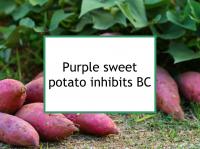Like common sweet potatoes, purple sweet potatoes have anti-inflammatory properties and are a rich source of beta-carotene and other beneficial compounds. However, purple sweet potatoes also have high levels of anthocyanins, including cyanidins, peonidins, and some delphinidin. Now a new study has reported that purple sweet potato peel extract inhibits carcinogen-induced cancer in an animal model of breast cancer.
Anthocyanins are closely-related plant pigments that give purple sweet potatoes their rich purple color. Women in the highest quartile (fourth) of anthocyanin intake were found to have significantly lower risk of breast cancer than those in the lowest quartile in one study.
Latest research finds purple sweet inhibits BC
The study referenced above was designed to investigate the chemopreventive potential of an ethanolic extract of the peel of Peruvian purple sweet potato (Ipomoea batatas) in an animal model of carcinogen-induced breast cancer. The extract was shown to have high anthocyanin content (138.92 mg/100 g dry extract) and significant antioxidant activity (comparable to quercetin at 1500 ppm).
To conduct the study, the authors randomized 50 female rats into five groups. Mammary tumors were induced in four of the groups by means of a single subcutaneous dose of 7,12-dimethylbenz(a)anthracene (DMBA). One group received only DMBA (the control group). Three of the groups received daily oral administration of sweet potato skin extract at various doses (200, 400, and 600 mg/kg body weight) for four months. The fifth group was administered the highest dose of extract without having tumors induced with DMBA. The chemopreventive effects of the extracts was assessed by evaluating tumor latency (time to become clinically detectable), tumor volume, and histopathological changes.
Tumor latency was found to be 101 days in group that received the highest extract dose (600 mg/kg) compared to the 88 days in the control group (which received no extract). The 600 mg/kg group also experienced markedly lower tumor volume (2.26 cm3) compared to the control group (15.21 cm3). Based on histological examination, the extract-treated rats also had dose-dependent improved ductal epithelial integrity and reduced necrosis.
The authors conclude that ethanolic extract of purple sweet potato peel had a dose-dependent chemopreventive effect against DMBA-induced breast cancer in rats. The findings warrant further investigation into the molecular mechanisms and clinical translation, according to the authors.
Please see sweet potatoes and the anthocyanins tag for more information.
